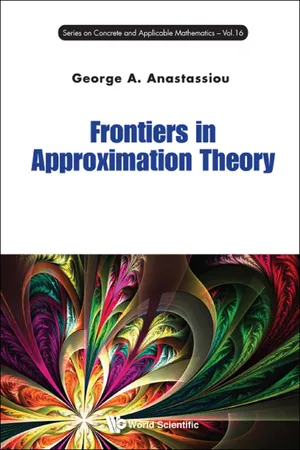
- 228 pages
- English
- ePUB (mobile friendly)
- Available on iOS & Android
Frontiers In Approximation Theory
About this book
This monograph presents the author's work of the last five years in approximation theory. The chapters are self-contained and can be read independently. Readers will find the topics covered are diverse and advanced courses can be taught out of this book.
The first part of the book is dedicated to fractional monotone approximation theory introduced for the first time by the author, taking the related ordinary theory of usual differentiation at the fractional differentiation level with polynomials and splines as approximators. The second part deals with the approximation by discrete singular operators of the Favard style, for example, of the Picard and Gauss–Weierstrass types. Then, it continues in a very detailed and extensive chapter on approximation by interpolating operators induced by neural networks, a connection to computer science. This book ends with the approximation theory and functional analysis on time scales, a very modern topic, detailing all the pros and cons of this method.
The results in this book are expected to find applications in many areas of pure and applied mathematics. So far, very little is written about fractional approximation theory which is at its infancy. As such, it is suitable for researchers, graduate students, and performing seminars as well as an invaluable resource for all science libraries.
Tools to learn more effectively

Saving Books

Keyword Search

Annotating Text

Listen to it instead
Information
Table of contents
- Cover Page
- Title Page
- Copyright Page
- Dedication
- Contents
- Preface
- 1. Fractional Monotone Approximation
- 2. Right Fractional Monotone Approximation Theory
- 3. Univariate Left Fractional Polynomial High Order Monotone Approximation Theory
- 4. Univariate Right Fractional Polynomial High Order Monotone Approximation Theory
- 5. Spline Left Fractional Monotone Approximation Theory Using Left Fractional Differential Operators
- 6. Spline Right Fractional Monotone Approximation Theory Using Right Fractional Differential Operators
- 7. Complete Fractional Monotone Approximation Theory
- 8. Lower Order Fractional Monotone Approximation Theory
- 9. Approximation Theory by Discrete Singular Operators
- 10. On Discrete Approximation by Gauss-Weierstrass and Picard Type Operators
- 11. Approximation Theory by Interpolating Neural Networks
- 12. Approximation and Functional Analysis over Time Scales
- Index
Frequently asked questions
- Essential is ideal for learners and professionals who enjoy exploring a wide range of subjects. Access the Essential Library with 800,000+ trusted titles and best-sellers across business, personal growth, and the humanities. Includes unlimited reading time and Standard Read Aloud voice.
- Complete: Perfect for advanced learners and researchers needing full, unrestricted access. Unlock 1.4M+ books across hundreds of subjects, including academic and specialized titles. The Complete Plan also includes advanced features like Premium Read Aloud and Research Assistant.
Please note we cannot support devices running on iOS 13 and Android 7 or earlier. Learn more about using the app